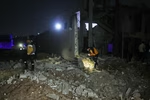GREVIO: Bosnia should take further measures to comply with Istanbul Convention

In its first baseline evaluation report on Bosnia and Herzegovina, the Council of Europe Group of Experts on Action against Violence against Women and Domestic Violence (GREVIO) highlighted positive legal and policy measures introduced by the authorities, but also outlined measures to meet requirements of the Convention on Preventing and Combating Violence against Women and Domestic Violence (Istanbul Convention).
In its report, GREVIO welcomes policies to secure gender equality, including gender-sensitive budgeting in ministries at the state and entity levels and the establishment of contact persons for gender equality. The report highlights positive steps, including the passing of new criminal legislation introducing the offences of forced genital mutilation (FGM), forced sterilisation, stalking, sexual harassment and forced marriage. GREVIO praises the provision of specialist victim support in domestic violence proceedings, via a “person of trust”, assisting victims and attending all their meetings and hearings before public institutions, including police and courts.
However, basing its findings on information obtained from the authorities, civil society and other sources, including an on-site visit to Bosnia and Herzegovina, GREVIO identifies challenges that require “urgent action” by the authorities to comply with the treaty.
GREVIO urges the authorities to amend the sexual offences provided under the national, entity-level and Brčko District criminal codes to fully incorporate the notion of lack of freely given consent as required by the Istanbul Convention and to specify the type of non-consensual sexual acts that are criminalised, in line with the convention. They furthermore should adopt measures to ensure that any offence of sexual violence applies between former or current spouses or partners and ensure proportionate and dissuasive sanctions for all sexual acts without the victim’s consent, irrespective of personal characteristics.
As the report finds that currently a clear pathway and a referral system for victims of sexual violence is not provided for and that trauma care and long-term psychological counselling is insufficient, GREVIO urges the authorities to set up rape crisis and/or sexual violence referral centres that provide immediate medical care, trauma support, forensic examinations and psychological assistance by qualified professionals, in line with treaty standards.
Regarding custody and visitation rights, GREVIO urges the authorities to take “priority actions” to ensure the safety of victims and their children and to “break the cycle of power and abuse” exercised by perpetrators. For example, authorities need to provide in law the exemption from mandatory mediation in proceedings dealing with separation, custody and visitation rights in cases of violence, including domestic violence, and explicitly provide in law that incidents of domestic violence against the non-abusive carer be considered in determining custody and visitation rights. Family courts should take into account any episodes of violence, including by consulting with all relevant professionals. All relevant professionals, especially staff from the Centres for Social Work and judges in family courts, should be trained in domestic violence and equipped with guidelines to enable them to discharge their obligation to ensure victim safety.
Regarding prosecution and procedural law, GREVIO is concerned that domestic violence and other forms of violence against women are considered by judges in Bosnia and Herzegovina as offences of low social danger. Worrying judicial and sentencing practices such as the predominant use of mitigating circumstances, the large use of plea-bargaining agreements and the imposition of very lenient sentences, are identified, bearing the risk of entailing a sentiment of impunity among perpetrators and victims alike.
On a broader level, GREVIO recommends setting up separate bodies for the coordination and implementation of policies and measures against all forms of violence against women and those in charge of their monitoring and evaluation. The authorities should introduce a data collection system that records asylum claims, based on gender-related persecution and introduce at all levels of education mandatory courses on these topics.
Finally, as required by the treaty, Bosnia and Herzegovina must ensure that one or more telephone helplines providing support to victims of all forms of violence against women are reachable in the whole territory, around the clock, completely free of charge and with due respect for the confidentiality and anonymity.
These and other findings are outlined in the executive summary as well.
Based on this report, the Committee of the Parties, which is composed of the representatives of the State Parties to the Convention, will publish its recommendations to Bosnia and Herzegovina in December this year.
Kakvo je tvoje mišljenje o ovome?
Učestvuj u diskusiji ili pročitaj komentare





 Srbija
Srbija
 Hrvatska
Hrvatska
 Slovenija
Slovenija



























































